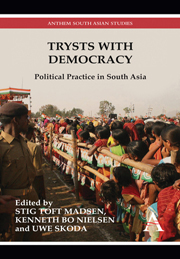1 - Introduction
Published online by Cambridge University Press: 05 March 2012
Summary
The European form of liberal democracy is derived from a singular set of historical and political developments particular to Western Europe, and constitutes only one among a range of alternative conceptions that have grown out of different social conditions (Frankel 2000; Jayal 2001, 9; Taylor 2007; Nugent 2008). In Trysts with Democracy, we analyse those clusters of political practices that combine to constitute democracy and democratic processes in South Asia. We do this by asking how democratic values are embedded in social and political institutions in South Asia, and how widely held ‘everyday’ political values inform the multiple ways in which democracy is imagined, understood and appropriated.
When Karl Marx surveyed British India, he dismissed its village communities as ‘the solid foundation of Oriental despotism’ (Marx 2000, 16–17). Since then democracy has acquired considerable temporal depth on the Indian Subcontinent. Toward the end of the nineteenth century, elections to municipalities and district boards were initiated under British rule. Autonomous and responsible provincial legislative councils were created around the First World War and fully developed with the Government of India Act in 1935. In Sri Lanka universal suffrage was already in place before Ceylon became independent (Richardson and Samarasinghe 1998), while independence brought universal adult suffrage to India. In 2008, a century and a half after Marx's observation, a Lokniti political science association team surveyed the state of democracy in South Asia and found the once solid foundation of Oriental despotism apparently crumbling.
- Type
- Chapter
- Information
- Trysts with DemocracyPolitical Practice in South Asia, pp. 1 - 16Publisher: Anthem PressPrint publication year: 2011



